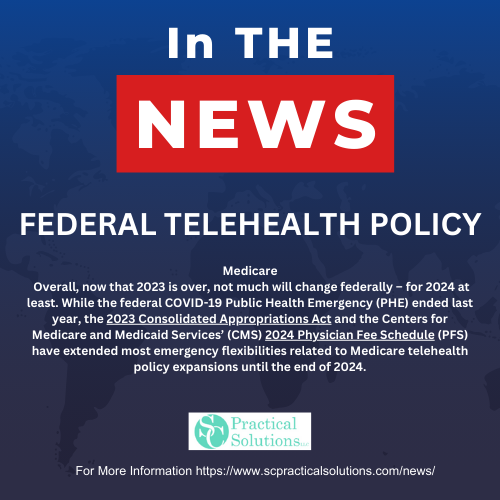
FEDERAL TELEHEALTH POLICY
Medicare
Overall, now that 2023 is over, not much will change federally – for 2024 at least. While the federal COVID-19 Public Health Emergency (PHE) ended last year, the 2023 Consolidated Appropriations Act and the Centers for Medicare and Medicaid Services’ (CMS) 2024 Physician Fee Schedule (PFS) have extended most emergency flexibilities related to Medicare telehealth policy expansions until the end of 2024.
It is still unknown whether further extensions or permanent policy expansions will be passed this year, but post-2024 the following permanent policies that are currently waived or expanded will be re-instituted unless further action is taken before January 1, 2025:
Other than these above permanent policies, the expanded list of approved Medicare telehealth services and eligible telehealth providers implemented during the PHE, as well as audio-only for non-mental health visits, are currently slated to expire post-2024, when permanent geographic and locational limitations would return. To monitor whether any pending federal legislative changes will modify existing policies and extensions, you can visit CCHP’s federal legislation tracker.
Privacy and Prescribing
While PHE privacy flexibilities have expired, prescribing allowances, allowing practitioners to prescribe controlled substances without an initial in-person visit, have also been extended through 2024.
STATE TELEHEALTH POLICY
State telehealth policies vary widely from state to state so it is always best to look at each individual state directly to understand the full picture. However, it is important to note that at this point in time most state emergencies have also ended and the respective temporary policies either expired, or more often than not, somehow incorporated into permanent policies. Though we should also note that there are a few states that have decided to further extend emergency policies consistent with the federal emergency policy extension through the end of next year, as evidenced in West Virginia’s Medicaid policies. Additionally, some states have incorporated a specific expiration date for certain policies into statute, such as Maryland’s policy related to maintaining audio-only through June 30, 2025.
In addition, for states that may have just passed new laws impacting telehealth, please review CCHP’s recently released 2023 Legislative Roundup. As noted in the roundup, while cross-state licensing remains the hottest topic across states, the number of bills addressing out-of-state providers was down this past year, while the number of bills addressing both Medicaid and private payer reimbursement went up. New regulatory requirements have been popular as well, so while state policies may have stabilized a bit post-PHE, they continue to change often in nuanced and varied ways.
VIEW TELEHEALTH POLICY BY STATE
Posted In: Resource Information, Uncategorized